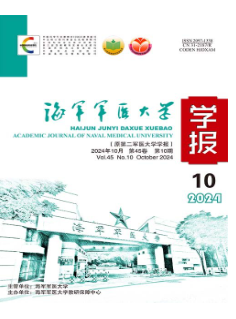Protective effect of naloxone injected into cisterna magna on brain tissues of rats following cardiopulmonary resuscitation
Q4 Medicine
引用次数: 0
Abstract
Objective To investigate the effects of naloxone injected into cisterna magna on S100βprotein and neuronspecific enolase(NSE)levels in serum and the histopathology of brain tissue of rats following cardiopulmonary resuscitation(CPR).Methods Thirty adult male SD rats were randomly divided into 3groups:Sham group,Conventional CPR group(intravenous injection of epinephrine,0.2mg/kg)and Naloxone CPR group(cisterna magna injection of naloxone,2mg/kg).Asphyxiation was used to set up rat cardiac arrest model,and corresponding drugs were given when the resuscitation was carried out.The blood samples were taken from orbital venous plexus at 0.5h,3h,6hand 24 hafter restoration of spontaneous circulation(ROSC).Enzyme-linked immunosorbent assay(ELISA)was used to detect serum levels of S100βprotein and NSE.Brain tissue was taken after the last blood sampling and the pathology of brain was observed by hematoxylineosin(H-E)staining.Results Serum S100βprotein levels of the Conventional CPR group and Naloxone CPR group were significantly higher than those of the Sham group at all time points(P0.01);compared with the Conventional CPR group,S100βprotein levels in Naloxone CPR group were significantly decreased at 3h,6h,and 24 hafter ROSC(P0.05 or P0.01).Serum NSE protein level of the Conventional CPR group at all time points and Naloxone CPR group at 6hand 24 hafter ROSC were significantly higher than those of the Sham group(P0.05 or P0.01).Serum NSE protein levels were significantly decreased at 6hand 24 hafter ROSC in Naloxone CPR group compared with the Conventional CPR group(P0.05 or P0.01).Moreover,hippocampus glial cells of Conventional CPR group were scattered and decreased,with condensed eosinophilic cytoplasm,narrowed nuclues,unclear nucleolus,and swollen and deformed capillaries.However,most nerve cells of Naloxone CPR group had rich cytoplasm and the nucleolus was clear;only a few nerve cells and capillaries showed edema-like changes of different degrees.Conclusion Naloxone injected into cisterna magna has a prominent protective effect on the brain of rats following cardiopulmonary resuscitation.大池注射纳洛酮对心肺复苏大鼠脑组织的保护作用
目的观察大池注射纳洛酮对心肺复苏大鼠血清s100 β蛋白和神经元特异性烯醇化酶(NSE)水平及脑组织组织病理学的影响。方法30只成年雄性SD大鼠随机分为3组:假手术组、常规心肺复苏组(静脉注射肾上腺素,0.2mg/kg)和纳洛酮心肺复苏组(大池注射纳洛酮,2mg/kg)。采用窒息法建立大鼠心脏骤停模型,复苏时给予相应药物。分别于自动循环恢复后0.5h、3h、6h和24 h在眶静脉丛采血。采用酶联免疫吸附试验(ELISA)检测血清s100 β蛋白和NSE水平。末次采血后取脑组织,采用苏木精球蛋白(H-E)染色观察脑组织病理。结果常规CPR组和纳洛酮CPR组血清s100 β蛋白水平在各时间点均显著高于假手术组(P0.01);与常规CPR组相比,纳洛酮CPR组在ROSC后3h、6h、24h血清s100 β蛋白水平均显著降低(P0.05或P0.01)。常规CPR组各时间点血清NSE蛋白水平及纳洛酮CPR组ROSC后6 ~ 24 h血清NSE蛋白水平均显著高于Sham组(P0.05或P0.01)。与常规CPR组相比,纳洛酮CPR组在ROSC后6 ~ 24 h血清NSE蛋白水平显著降低(P0.05或P0.01)。常规CPR组海马胶质细胞分散、减少,胞浆嗜酸性凝聚,细胞核变窄,核仁不清,毛细血管肿胀变形。但纳洛酮CPR组大部分神经细胞细胞质丰富,核仁清晰,仅有少数神经细胞和毛细血管出现不同程度的水肿样改变。结论大池注射纳洛酮对心肺复苏后大鼠脑有明显的保护作用。
本文章由计算机程序翻译,如有差异,请以英文原文为准。
求助全文
约1分钟内获得全文
求助全文
来源期刊

海军军医大学学报
Medicine-Medicine (all)
CiteScore
0.50
自引率
0.00%
发文量
14752
期刊介绍:
Founded in 1980, Academic Journal of Second Military Medical University(AJSMMU) is sponsored by Second Military Medical University, a well-known medical university in China. AJSMMU is a peer-reviewed biomedical journal,published in Chinese with English abstracts.The journal aims to showcase outstanding research articles from all areas of biology and medicine,including basic medicine(such as biochemistry, microbiology, molecular biology, genetics, etc.),clinical medicine,public health and epidemiology, military medicine,pharmacology and Traditional Chinese Medicine),to publish significant case report, and to provide both perspectives on personal experiences in medicine and reviews of the current state of biology and medicine.
 求助内容:
求助内容: 应助结果提醒方式:
应助结果提醒方式:


